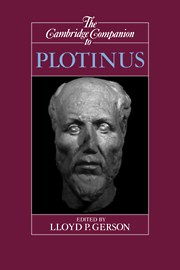Book contents
- Frontmatter
- Introduction
- 1 Plotinus
- 2 Plotinus's metaphysics of the One
- 3 The hierarchical ordering of reality in Plotinus
- 4 On soul and intellect
- 5 Essence and existence in the Enneads
- 6 Plotinus on the nature of physical reality
- 7 Plotinus on matter and evil
- 8 Eternity and time
- 9 Cognition and its object
- 10 Self-knowledge and subjectivity in the Enneads
- 11 Plotinus
- 12 Human freedom in the thought of Plotinus
- 13 An ethic for the late antique sage
- 14 Plotinus and language
- 15 Plotinus and later Platonic philosophers on the causality of the First Principle
- 16 Plotinus and Christian philosophy
- Bibliography
- Index
2 - Plotinus's metaphysics of the One
Published online by Cambridge University Press: 28 May 2006
- Frontmatter
- Introduction
- 1 Plotinus
- 2 Plotinus's metaphysics of the One
- 3 The hierarchical ordering of reality in Plotinus
- 4 On soul and intellect
- 5 Essence and existence in the Enneads
- 6 Plotinus on the nature of physical reality
- 7 Plotinus on matter and evil
- 8 Eternity and time
- 9 Cognition and its object
- 10 Self-knowledge and subjectivity in the Enneads
- 11 Plotinus
- 12 Human freedom in the thought of Plotinus
- 13 An ethic for the late antique sage
- 14 Plotinus and language
- 15 Plotinus and later Platonic philosophers on the causality of the First Principle
- 16 Plotinus and Christian philosophy
- Bibliography
- Index
Summary
Of the three first principles (archai) or hypostases, One, Intellect, and Soul, the One or Good is the most difficult to conceive and the most central to understanding Plotinian philosophy. It is everything and nothing, everywhere and nowhere. The One is the source (archê) of all beings and, as the Good, the goal (telos) of all aspirations, human and non-human. As the indemonstrable first principle of everything, as transcendent infinite being, and as the supreme object of love, the One is the center of a vibrant conception of reality many of whose facets resist philosophical analysis. Efforts to understand or to define the nature of the One, Plotinus believes, are doomed to be inadequate. We speak about it, but in reality these efforts only amount to “making signs to ourselves about it”; it is not possible for anyone to say what it is (V.3.13.7, 14.1-7). Despite this insistence on the ineffability of the first principle Plotinus talks about it constantly, making radical claims about its universal role in the structure of reality. Only by reflecting on the internal logic of his metaphysics can we recognize the multi-faceted nature of this unitary principle.
TALKING ABOUT THE ONE
Three interrelated factors motivate Plotinus's philosophy of the One: tradition, reason, and experience. Since the influence of his predecessors, especially Plato and Aristotle, on Plotinus is discussed in Chapter 1, here we will examine the contributions made by rational argument and personal experience toward articulating the metaphysics of the One.
- Type
- Chapter
- Information
- The Cambridge Companion to Plotinus , pp. 38 - 65Publisher: Cambridge University PressPrint publication year: 1996
- 20
- Cited by

